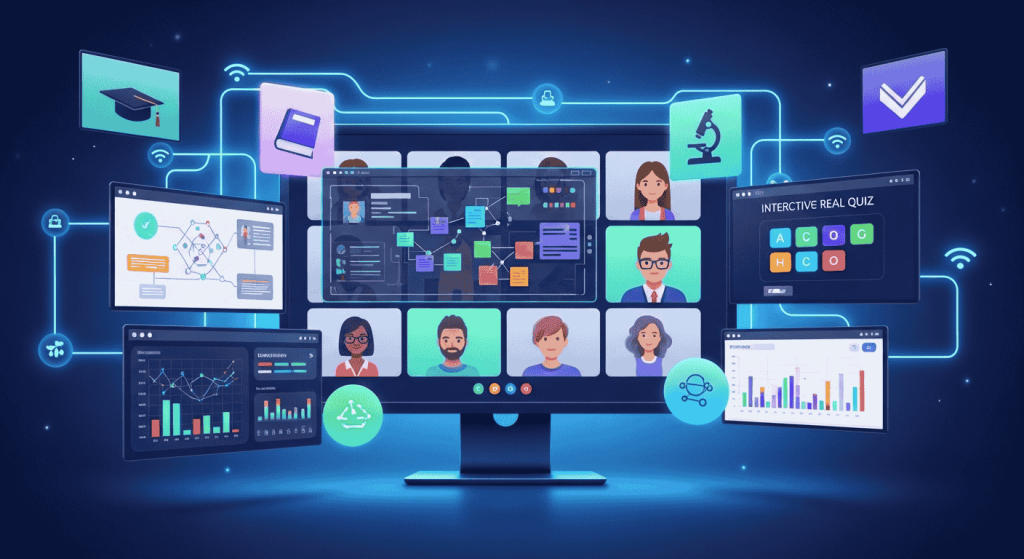📚 Introduction: The Rise of Virtual Classrooms
The education landscape has undergone a seismic shift in recent years. Virtual classrooms and digital tools have emerged as the cornerstones of modern education, empowering students and educators to transcend the limitations of traditional learning environments. With the rise of high-speed internet, cloud computing, and educational apps, online education is no longer just an alternative — it’s becoming the norm.
Whether you’re a teacher adapting to remote teaching, a parent exploring e-learning platforms, or a student seeking digital learning tools that enhance your experience, understanding this digital transformation is crucial.
💡 What Is a Virtual Classroom?
A virtual classroom is an online learning space that allows real-time interaction between teachers and students using video conferencing, collaborative tools, and digital whiteboards. Unlike traditional classrooms, these environments are accessible from anywhere and offer flexible learning opportunities.
Key Features of Virtual Classrooms:
-
Live video and audio communication
-
Interactive whiteboards
-
Breakout rooms for group discussions
-
Real-time quizzes and polls
-
File sharing and cloud-based storage
AI-Powered Learning Tools: Revolutionizing Education
🛠️ Top Digital Tools for Virtual Learning
The right digital learning tools can significantly enhance engagement, comprehension, and retention. Here’s a table of popular tools that are widely used in 2025:
| Tool Name | Purpose | Best For |
|---|---|---|
| Google Classroom | Assignment & class management | Schools and higher education |
| Zoom | Live virtual lessons | K–12 and universities |
| Kahoot! | Gamified learning & quizzes | All age groups |
| Canva for Education | Creative projects & presentations | Teachers and students |
| Microsoft Teams | Collaboration & video conferencing | School districts and colleges |
These tools support remote teaching, streamline content delivery, and promote interactive online education.
🌍 Benefits of Virtual Classrooms
Embracing a virtual learning environment offers several compelling advantages for both educators and learners.
✅ Advantages for Students:
-
Learn from anywhere, anytime
-
Access to global learning resources
-
Personalized learning pace
-
Greater accessibility for students with disabilities
✅ Advantages for Teachers:
-
Efficient content delivery and grading
-
Real-time student progress tracking
-
Integration with other edtech tools
-
Opportunities for creative and multimedia instruction
Child Health & Nutrition: A Parent’s Ultimate Guide
🔍 How to Choose the Best E-Learning Platform
When selecting an e-learning platform, consider the following:
-
Ease of use for students and educators
-
Compatibility with existing digital tools
-
Security and privacy features
-
Support for asynchronous and synchronous learning
-
Built-in analytics for tracking progress
💼 Virtual Classrooms in Corporate Training
Beyond schools and universities, virtual classrooms are now widely used in corporate learning environments. Companies are leveraging online education tools for employee onboarding, professional development, and compliance training.
Popular platforms for corporate use:
-
Moodle
-
Coursera for Business
-
LinkedIn Learning
-
TalentLMS
These platforms ensure consistent training across global teams and help reduce costs.
Digital Literacy & Safety for Kids: A Parent’s Guide to 2025
🤖 Future Trends in Virtual Learning
Looking ahead, virtual classrooms and digital tools will continue to evolve with technologies like:
-
Artificial Intelligence (AI) for personalized learning paths
-
Virtual Reality (VR) for immersive simulations
-
Blockchain for secure credentialing and certification
-
Gamification to boost motivation and retention
AI in Autonomous Vehicles: Transforming the Future of Transportation
🙋♀️ FAQ: Virtual Classrooms & Digital Tools
1. What are the best digital tools for virtual classrooms?
Popular tools include Zoom, Google Classroom, Microsoft Teams, and Kahoot!. These edtech tools offer interactive, collaborative features ideal for online teaching.
2. How do virtual classrooms benefit students?
They offer flexible access, personalized learning, and inclusive features, especially useful for remote or non-traditional learners.
3. Are virtual classrooms effective for young children?
Yes, when combined with engaging content and parent/teacher support. Platforms like ClassDojo and Seesaw are designed specifically for younger learners.
📢 Call to Action
Ready to upgrade your teaching or learning experience? Explore the best digital tools for virtual classrooms and start building a smarter future today.
🔑 Final Thoughts
As technology continues to reshape education, mastering virtual classrooms and digital tools is more important than ever. Whether you’re part of a school, university, or organization, these solutions provide powerful opportunities for innovation, accessibility, and growth.
By choosing the right e-learning platforms and embracing digital transformation, educators and learners can unlock limitless possibilities in 2025 and beyond.












